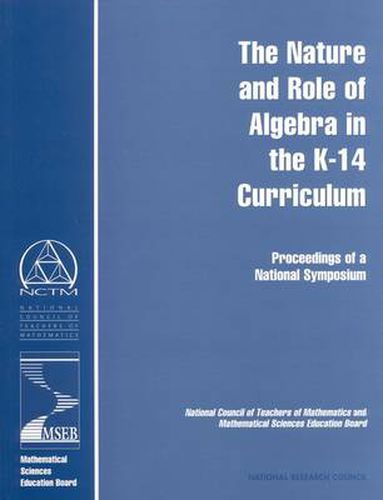Readings Newsletter
Become a Readings Member to make your shopping experience even easier.
Sign in or sign up for free!
You’re not far away from qualifying for FREE standard shipping within Australia
You’ve qualified for FREE standard shipping within Australia
The cart is loading…






With the 1989 release of Everybody Counts by the Mathematical Sciences Education Board (MSEB) of the National Research Council and the Curriculum and Evaluation Standards for School Mathematics by the National Council of Teachers of Mathematics (NCTM), the standards movement in K-12 education was launched. Since that time, the MSEB and the NCTM have remained committed to deepening the public debate, discourse, and understanding of the principles and implications of standards-based reform. One of the main tenets in the NCTM Standards is commitment to providing high-quality mathematical experiences to all students. Another feature of the Standards is emphasis on development of specific mathematical topics across the grades. In particular, the Standards emphasize the importance of algebraic thinking as an essential strand in the elementary school curriculum.
Issues related to school algebra are pivotal in many ways. Traditionally, algebra in high school or earlier has been considered a gatekeeper, critical to participation in postsecondary education, especially for minority students. Yet, as traditionally taught, first-year algebra courses have been characterized as an unmitigated disaster for most students. There have been many shifts in the algebra curriculum in schools within recent years. Some of these have been successful first steps in increasing enrollment in algebra and in broadening the scope of the algebra curriculum. Others have compounded existing problems. Algebra is not yet conceived of as a K-14 subject. Issues of opportunity and equity persist. Because there is no one answer to the dilemma of how to deal with algebra, making progress requires sustained dialogue, experimentation, reflection, and communication of ideas and practices at both the local and national levels. As an initial step in moving from national-level dialogue and speculations to concerted local and state level work on the role of algebra in the curriculum, the MSEB and the NCTM co-sponsored a national symposium, The Nature and Role of Algebra in the K-14 Curriculum, on May 27 and 28, 1997, at the National Academy of Sciences in Washington, D.C.
$9.00 standard shipping within Australia
FREE standard shipping within Australia for orders over $100.00
Express & International shipping calculated at checkout
Stock availability can be subject to change without notice. We recommend calling the shop or contacting our online team to check availability of low stock items. Please see our Shopping Online page for more details.
With the 1989 release of Everybody Counts by the Mathematical Sciences Education Board (MSEB) of the National Research Council and the Curriculum and Evaluation Standards for School Mathematics by the National Council of Teachers of Mathematics (NCTM), the standards movement in K-12 education was launched. Since that time, the MSEB and the NCTM have remained committed to deepening the public debate, discourse, and understanding of the principles and implications of standards-based reform. One of the main tenets in the NCTM Standards is commitment to providing high-quality mathematical experiences to all students. Another feature of the Standards is emphasis on development of specific mathematical topics across the grades. In particular, the Standards emphasize the importance of algebraic thinking as an essential strand in the elementary school curriculum.
Issues related to school algebra are pivotal in many ways. Traditionally, algebra in high school or earlier has been considered a gatekeeper, critical to participation in postsecondary education, especially for minority students. Yet, as traditionally taught, first-year algebra courses have been characterized as an unmitigated disaster for most students. There have been many shifts in the algebra curriculum in schools within recent years. Some of these have been successful first steps in increasing enrollment in algebra and in broadening the scope of the algebra curriculum. Others have compounded existing problems. Algebra is not yet conceived of as a K-14 subject. Issues of opportunity and equity persist. Because there is no one answer to the dilemma of how to deal with algebra, making progress requires sustained dialogue, experimentation, reflection, and communication of ideas and practices at both the local and national levels. As an initial step in moving from national-level dialogue and speculations to concerted local and state level work on the role of algebra in the curriculum, the MSEB and the NCTM co-sponsored a national symposium, The Nature and Role of Algebra in the K-14 Curriculum, on May 27 and 28, 1997, at the National Academy of Sciences in Washington, D.C.